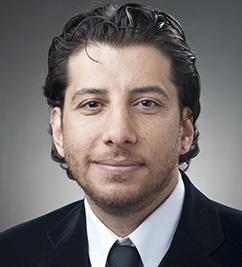“Seven Questions” with Aydin Bal
October 28, 2015

Aydin Bal
Aydin Bal is a researcher at the Wisconsin Center for Education Research and an assistant professor in rehabilitation psychology and special education in UW-Madison's School of Education. He is leading an initiative to improve equity in schools across Wisconsin by implementing Culturally Responsive Positive Behavior Interventions and Supports (CRPBIS), a framework he developed to prompt locally meaningful and sustainable change in schools.
Tell us about your current work.
I am working with the student services team of the Madison Metropolitan School District (MMSD) and the School of Education’s Partner School Network to make radical change–to open up their schools’ decision-making activities to students, families and community members, specifically those from historically marginalized communities.
We are scaling up Learning Labs, a process I developed based on a statewide research study, to design positive and supportive school discipline and behavioral support systems. This year we’ll implement Labs in Leopold Elementary and O’Keefe and Jefferson Middle schools. The goal is to expand throughout the district. I am grateful and excited to see the real life implementation and impact of my research.
What’s the burning issue driving your research?
I want to support equity-oriented systemic transformations in Wisconsin schools. For example, changing our ranking as one of the worst states for education and life outcomes among African-American and Native American youth. I want to work with schools build an adaptive, inclusive and socially just system that’s locally meaningful and sustainable. Those are key words for us.
The working structure for this community-school-university collaboration is ideal. A research team analyzed a systemic problem in local schools, overrepresentation of minority students in exclusionary and punitive school discipline, and in special education placements for behavioral disability. Next we tested and revised the Learning Lab methodology that I developed in local schools, and now the schools use this process.
Tell us about the learning lab model.
In education, often we exclusively focus on the outcomes at the expense of targeting the system that produced those outcomes. CRPBIS Learning Labs allow educators to intervene in the racialization of behavioral problems and to design culturally responsive support systems schoolwide from the ground-up with—not for—local stakeholders. With Wisconsin facing increasing racial disparities, the state is ready for systemic transformation. To open up and change a system, schools must embrace a systematic intervention that brings marginalized communities, such as refugee families, African American students, and civic organizations, into the decision-making processes.
How does the process work?
Each Learning Lab includes about a dozen people, such as administrators, special and general education teachers, paraprofessionals, students, parents, district behavioral support team members, representatives from community organizations and members of non-dominant cultural and linguistic groups. Learning Labs also include behavioral support team members from the school district and local civic organizations such as Urban League, Centro Hispano and YWCA Madison.
Learning Labs collectively examine racial disparities in their school and ask: Where do we want to go? What is our behavioral support system and practices? What may be the root causes of these problems? This leads to a complete systemic analysis.
So learning labs provide a structure for finding ways to improve.
Yes, during an academic year, parents, students and teachers examine systemic tensions in schools from larger societal patterns. Learning Lab members use tensions as systemic motivation for positive change. The CRPBIS team does not impose solutions. They form a clear goal and provide a forum for discourse, a logic model and a plan for running meetings. They provide the space and time for a school community to reflect, experiment, and design new systems through a critical dialogue and data-based systemic analysis. In the new systems, the proactive steps are offering engaging curriculum, and setting clear expectations that are responsive to diverse needs, interests, and goals of local school communities. That's what I mean by cultural responsiveness.
Tell us about the resource maps you developed.
Our team analyzed the state's student and school level data and developed interactive data maps. The map of risk, shows racial disparities in behavioral outcomes in all public school districts in Wisconsin. The map of opportunities provides information about racial, income and linguistic diversity, suspension and expulsion rates, and local community resources for each public school in Madison and Sun Prairie. We also offer practitioner briefs, research papers and CRPBIS presentations on our website.
What do you hope will result from this work?
I hope this partnership between UW-Madison and local education systems will be sustained and evolve into a larger coalition able to address pressing equity issues in our state. This partnership also offers a strategic, inquiry-based method of university-school cooperation for students in our School of Education. Through Learning Labs, the novice teachers and researchers in the CRPBIS team learn the education system inside-out, working side by side with practitioners, students and community leaders as partners. This experience provided more expansive and multiplicative research and service learning opportunities for our students. I call it "coalition building," blurring the boundaries of the typical vertical, hierarchical structure. It goes beyond the dichotomousview of research and practice and maintains fluidity, reflexivity, and inclusivity in education research and practice for the purpose of systemic transformation.


